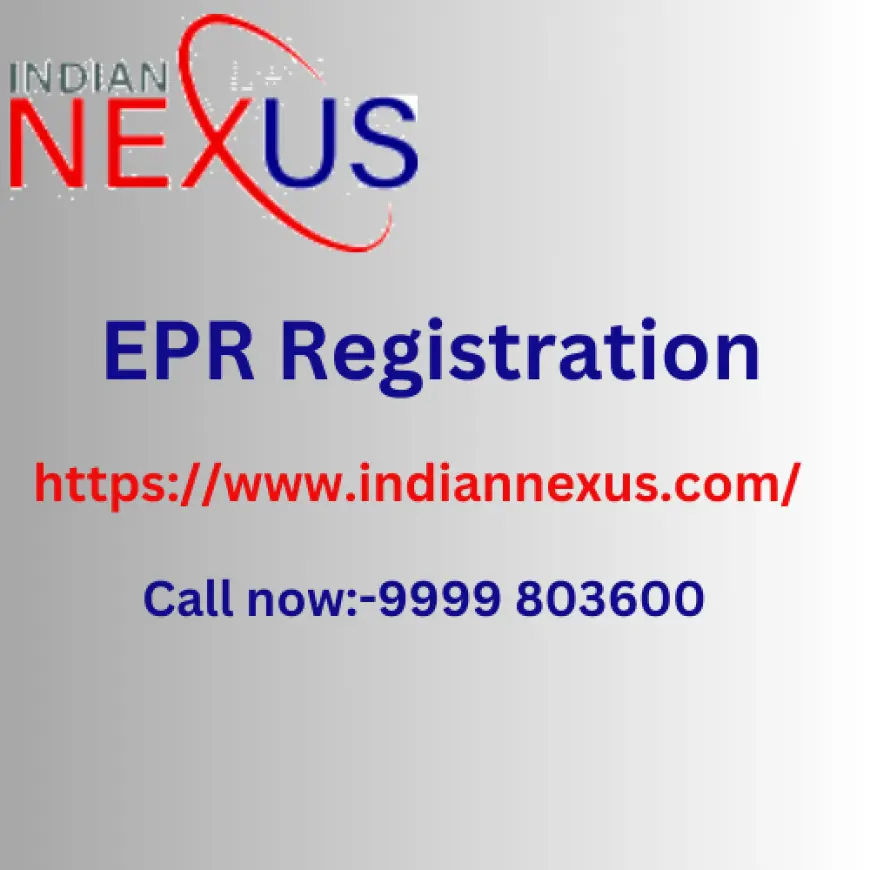EPR Registration
Get EPR Registration for legal compliance and sustainable waste management. IndianNexus offers expert assistance in CPCB approvals, documentation, and compliance. Ensure hassle-free registration and regulatory adherence. Contact us today!

EPR Registration is mandated under various environmental regulations such as the Plastic Waste Management Rules, 2016, and E-Waste Management Rules, 2016, introduced by the Ministry of Environment, Forest, and Climate Change (MoEF&CC) in India. The Central Pollution Control Board (CPCB) oversees the enforcement of these regulations, ensuring that businesses comply with the necessary waste collection, recycling, and disposal responsibilities.
Who Needs EPR Registration?
EPR Registration is mandatory for businesses involved in the production, import, distribution, or sale of products that contribute to waste generation. The primary categories include:
- Producers – Businesses manufacturing goods that generate plastic or e-waste.
- Importers – Companies importing plastic packaging, electronic goods, or other regulated products.
- Brand Owners – Entities selling products under their brand name but using third-party manufacturers.
- Manufacturers – Companies producing plastic packaging materials, batteries, or electronic equipment.
Without a valid EPR Registration, these entities are not allowed to operate legally in India. Non-compliance can lead to penalties, including heavy fines and the suspension of business operations.
Benefits of EPR Registration
1. Legal Compliance and Avoidance of Penalties
EPR Registration ensures that businesses comply with Indian environmental regulations. Non-compliance can result in severe penalties, including fines and legal action by CPCB or state pollution control boards (SPCBs).
2. Environmental Sustainability
By registering under the EPR framework, businesses contribute to reducing environmental pollution. The initiative promotes waste recycling, reducing landfill waste and encouraging sustainable waste disposal practices.
3. Enhanced Brand Reputation
Companies with valid EPR Registration demonstrate their commitment to environmental responsibility. This enhances their corporate reputation, making them more attractive to eco-conscious consumers and investors.
4. Access to New Markets and Business Growth
Many international markets now require businesses to comply with EPR policies. Obtaining EPR Registration helps Indian businesses expand globally by meeting international environmental standards.
5. Cost-Effective Waste Management
With proper EPR implementation, businesses can reduce their waste management costs by collaborating with authorized recyclers, waste collectors, and disposal facilities.
EPR Registration Process in India
The process of obtaining EPR Registration involves multiple steps, requiring businesses to prepare documentation and follow compliance procedures. Below is a step-by-step guide:
Step 1: Identify EPR Obligations
Businesses must assess their waste generation levels and understand their responsibilities under EPR guidelines. Depending on the type of waste (plastic, e-waste, batteries, etc.), different compliance measures must be followed.
Step 2: Engage with an EPR Consultant
Companies can seek assistance from EPR consultants like IndianNexus, who provide end-to-end support for EPR Registration. These consultants help businesses with documentation, application filing, and compliance management.
Step 3: Prepare Required Documentation
The following documents are typically required for EPR Registration:
- Business Registration Certificate (GST Certificate, Incorporation Certificate)
- Import-Export Code (IEC), if applicable
- Product details and waste generation estimates
- Agreement with authorized recyclers or Producer Responsibility Organizations (PROs)
- Waste collection and disposal plan
- Annual waste management report
Step 4: Online Application Submission
The EPR Registration application is submitted online through the CPCB portal. Businesses must upload the required documents and provide details of their waste management strategy.
Step 5: Verification and Approval
CPCB reviews the application and may request additional information or modifications. Upon successful verification, businesses receive the EPR Registration certificate. The validity of this certificate is generally five years, after which renewal is required.
Responsibilities of Businesses After EPR Registration
After obtaining EPR Registration, businesses must ensure continuous compliance with waste management regulations. Key responsibilities include:
1. Waste Collection and Recycling
Businesses must establish collection systems for used products and collaborate with authorized recyclers to ensure proper disposal.
2. Consumer Awareness Programs
Companies must educate consumers about proper waste disposal and recycling practices, often through labeling, product packaging, and promotional campaigns.
3. Annual Compliance Reports
EPR-registered businesses must submit annual reports detailing their waste collection, recycling, and disposal activities. These reports are mandatory for maintaining compliance with CPCB regulations.
4. Renewal of EPR Registration
Since EPR Registration is valid for a specific period, businesses must renew their registration before expiry to continue operations without legal issues.
Challenges in EPR Registration
While EPR Registration is beneficial, businesses often face several challenges during the process:
- Complex Regulatory Requirements – Different types of waste require compliance with varying rules, making it difficult for businesses to navigate the process.
- High Costs of Compliance – Managing waste collection, recycling, and reporting can be expensive, especially for small businesses.
- Lack of Infrastructure – Inadequate recycling and disposal facilities can create logistical challenges for businesses trying to comply with EPR regulations.
- Limited Awareness – Many businesses remain unaware of their EPR obligations, leading to unintentional non-compliance.
How IndianNexus Can Help with EPR Registration
IndianNexus provides expert assistance for businesses seeking EPR Registration. Their services include:
- Regulatory Guidance – Understanding CPCB and MoEF&CC regulations.
- Documentation Support – Preparing and submitting required documents.
- Compliance Management – Ensuring businesses meet their waste management responsibilities.
- Authorized Recycler Partnerships – Connecting businesses with certified recyclers for waste disposal.
- Annual Reporting Assistance – Filing mandatory compliance reports with CPCB.
With a team of experts, IndianNexus simplifies the EPR Registration process, ensuring businesses achieve compliance efficiently.
Conclusion
EPR Registration is a crucial step for businesses involved in plastic, electronic, and hazardous waste production. It ensures legal compliance, promotes environmental sustainability, and enhances brand reputation. Despite challenges, companies can streamline the registration process by working with expert consultants like IndianNexus.
For seamless EPR Registration, businesses should take proactive steps in waste management, adopt sustainable practices, and stay updated on regulatory changes. By doing so, they contribute to a greener future while ensuring long-term business success.
Contact IndianNexus today for expert guidance on EPR Registration!












